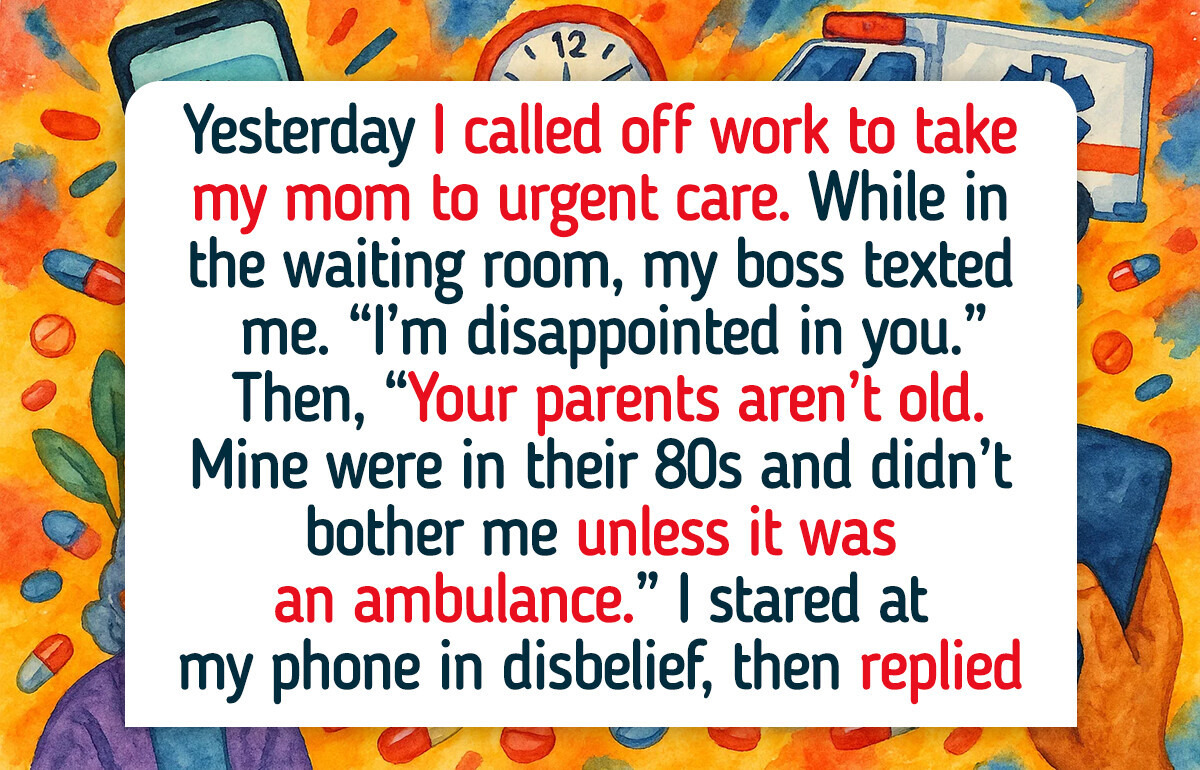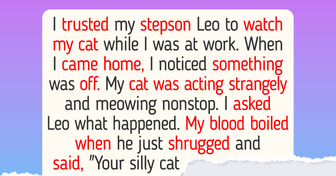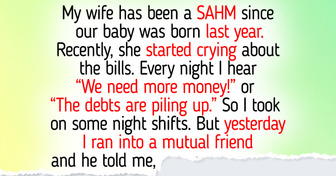If you decide to stay, do the bare minimum. Don’t stay late.
My Boss Was Upset I Took My Mom to the Hospital, He’s Not Ready for My Clapback

Trying to juggle work and family is already stressful enough, but sometimes it’s not the situation; it’s the people who make it worse. One reader shared how taking a single day off spiraled into a clash they never saw coming. What should’ve been a private, personal choice suddenly turned into a test of loyalty at work, and the fallout was anything but ordinary.
Caring for my mom makes me a “disappointment” at work
So yesterday, I called off work because my mom wasn’t feeling well. She’s been having some weird symptoms, and I didn’t want to take any chances, so I took her to urgent care to get checked out. I figured it was the right thing to do; she’s my mom, she’s not well, and I had the PTO (paid time off).
Anyway, while I was in the waiting room, my boss texted me. Not to check on anything work-related. Not to ask if everything was okay. He just said, “I’m disappointed in you.”
Then he follows it up with, “You’re 29? That would make your parents in their 50s or early 60s. Tell them to get their own self to the doctor. Your parents aren’t old. Mine were in their 80s and didn’t bother me unless they were leaving in an ambulance.”
Like... what??
I reminded him why his office still functions
He was implying that I was being irresponsible or soft for choosing to be there for my mom. And I just snapped. I texted back, “You’re only disappointed because I do all the work and everyone else is lazy.”
Which, tbh, is true. I’ve been pulling the weight of three people in that office. I rarely complain, I show up, I stay late when needed, and when I finally take a day to take care of someone else, suddenly it’s the end of the world. He didn’t respond after that, but a coworker told me he said he would’ve fired me if I’d said that to his face.
Some managers love to guilt-trip employees for using PTO or setting boundaries, but you don’t have to just take it. Here are some real-world tips to handle a bad boss, protect yourself, and survive a toxic workplace.
Document everything
- If your boss is sending you texts like “I’m disappointed in you” for using PTO, keep receipts. Screenshot the texts, save emails, and jot down dates/times. HR and higher-ups respond to evidence, not vibes.
Know your company’s policies better than your boss does
- If your PTO policy says you can take time off, then that’s it. No “disappointed” clause in the handbook. Having the written policy handy gives you leverage when they try to guilt-trip you.
Start setting boundaries early
- It feels awkward, but responding with: “I’m not available today, I’ll handle this when I’m back in” sets the tone. Bosses like this push until you push back. Boundaries are uncomfortable at first, but they train people how to treat you.
Quietly prep an exit plan
- Toxic workplaces rarely get less toxic. Update your résumé, apply casually, and remember: companies don’t hesitate to fire someone, so don’t hesitate to leave when the time is right. Even having options changes the way you handle situations.
Find allies at work
- Coworkers talk, and chances are you’re not the only one fed up. Sometimes, a united front (“we’re all overworked, not just me”) carries more weight than a single complaint. Even a small group chat with colleagues can help keep your sanity.

Detach emotionally from their approval
- Bosses like this want you to feel guilty. But once you realize “disappointed” is just a manipulation tactic, it loses power. You’re not a bad employee for taking care of your mom. You’re just someone with priorities outside of padding his productivity metrics.
At the end of the day, managers like this feed on guilt and manipulation, making employees feel guilty for living a life outside the office. Check out our examples of these kinds of bosses here.
Comments
Take those texts to HR if you have one. You had PTO. If you wanted to use that day to watch two hamster play hopscotch, it isn't his business or concern and if he wants to push it and fire you, you will hire a lawyer for wrongful termination. I'd start looking for a new job and have it secured and on the first day of the new job, I'd mail my resignation to that AH boss, effective immediately.
Related Reads
I Trusted My Stepson to Watch My Cat, and What Happened Still Makes My Blood Boil

12 Plot Twists So Wild, They Could Make Hitchcock Rise Just to Applaud

14 People Who Learned the Shocking Truth About a Friend

16 Women Revealed the One Betrayal That Made Them End a Friendship for Good

I Refuse to Support My SAHM Wife After Discovering Her Secret

My Neighbor Disrespected My Privacy—My Revenge Was Sweet

I Refuse to Help My Pregnant Sister, and I Don’t Feel Guilty

11 People Whose Small Acts of Kindness Turned Tears Into Smiles

10 Moments When Kindness Was the Ultimate Power Move

10 Moments Where Kindness Didn’t Argue—It Acted

12 People Whose Kind Hearts Became a Lifeline in Someone’s Darkest Moment

10+ People Who Went on Holiday for Comfort but Got a Crazy Story Instead




